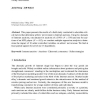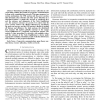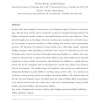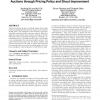85
Voted
ECR
2007
15 years 1 months ago
2007
Abstract This paper presents the results of a field study conducted to elucidate critical factors that determine sellers’ net revenue in Internet auctions. Using two datasets of...
108
Voted
JSAC
2008
15 years 1 months ago
2008
Abstract--Distributed and efficient resource allocation is critical for fully realizing the benefits of cooperative communications in large scale communication networks. This paper...
103
Voted
JCST
2008
15 years 1 months ago
2008
In most of the used auction systems the values of bids are known to the auctioneer. This allows him to manipulate the outcome of the auction. Hence, one is interested in hiding th...
114
Voted
IJISEC
2006
15 years 1 months ago
2006
Abstract Privacy has become a factor of increasing importance in auction design. We propose general techniques for cryptographic first-price and (M + 1)st-price auction protocols t...
89
Voted
IMCS
2008
15 years 1 months ago
2008
Purpose
119
Voted
CORR
2006
Springer
15 years 1 months ago
2006
Springer
In set-system auctions, there are several overlapping teams of agents, and a task that can be completed by any of these teams. The auctioneer's goal is to hire a team and pay...
121
Voted
DA
2010
15 years 1 months ago
2010
Several papers compare auctioning heterogeneous assets sequentially with sequentially selling the right to choose among assets not yet taken. Typically motivated by auctions of co...
80
Voted
COR
2010
15 years 1 months ago
2010
Activity rules have emerged in recent years as an important aspect of practical auction design. The role of an activity rule in an iterative auction is to suppress strategic behav...
126
Voted
ATAL
2006
Springer
15 years 3 months ago
2006
Springer
In this paper we present the internal architecture and bidding mechanisms designed for Mertacor, a successful trading agent, which ended up first in the Classic Trading Agent Comp...
100
Voted
ATAL
2006
Springer
15 years 4 months ago
2006
Springer
Auction mechanism design is a subfield of game theory dedicated to manipulating the rules of an auction so as to achieve specific goals. The complexity of the dynamics of auctions...




